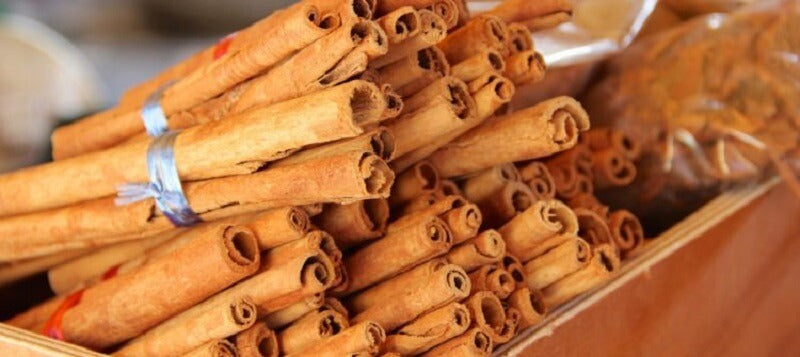Cinnamon is a bone of contention – the story of an unusual spice
The mythical Chinese emperor Shennong, called the "Divine Farmer," was said to have grown cinnamon in his herbarium 5,000 years ago . The figure comes from Chinese mythology and is said to prove that plant cultivation played a key role for the ancient Chinese, and that they had many achievements in this field. How much truth is there to this? After all, these are myths, and it is difficult to say whether cinnamon began its journey from China. What is certain is that Chinese cinnamon (i.e., Cassia or Cassia) was an extremely valuable product in the Middle Kingdom.
The Taoists considered cinnamon the food of the gods. The bark, ground into a pulp, was one of the ingredients of the elixir that gave the body a divine golden yellow color and strength—yang. Carrying it was supposed to ward off any illness, but in reality, it probably allowed one to tolerate the unpleasant odor that prevailed in the streets of larger settlements.
It is also said that it is a mistake to associate cinnamon with China as the birthplace of this spice. The popular Ceylon cinnamon is often confused with another type of cinnamon – Cassia, the aforementioned less noble and aromatic cinnamon. However, the two varieties differ slightly from each other. The Ceylon cinnamon achieved greater fame and recognition around the world, and wars have been fought over it.
Introduction to the Cinnamon Wars
Chinese cinnamon, Cassia, was the first to reach Europe. The path to the Old Continent for cinnamon was paved by Egypt, where the spice originated from Ethiopia or Arabia.
Starting in the 3rd century BC, cinnamon traveled along the Silk Road from the former capital of China, Xi'an, to Constantinople. Cinnamon's prestige was so great that Roman emperors kept it in their vaults along with other treasures and jewels. For centuries, cinnamon was a spice available only to the world's most prominent people.
An important fact from the history of the spice is that between the 12th and 14th centuries, the cinnamon trade was in the hands of the Venetians, who had a network of vassals who dictated extremely high prices for cinnamon. Despite this, the demand for cinnamon did not decrease, and the trade routes and factories controlled by the Venetians gave them a monopoly. However, nothing lasts forever. At that time, the Portuguese - Vasco da Gama - entered the historical scene. He discovered the sea route to India and... Ceylon in the Indian Ocean. The Portuguese immediately sensed a business opportunity and followed the traveler en masse to the island. The Venetians living there were given no chance, and the natives were turned into slaves. In just one year, more than 11 tons of cinnamon were delivered to Lisbon.
The Dutch, who broke Portuguese dominance in 1640, didn't make life any easier for the locals. They monopolized the market by founding the world's first international corporation – the Dutch East India Company. After just over 150 years, the Dutch were driven out of the market by the English. From 1796 onwards, they produced cinnamon of somewhat lower quality but on a much larger scale.
Cinnamon today
Today, cinnamon is a staple ingredient in almost every kitchen. But why is this spice so popular? In the past, it was valued for its beautiful aroma and unique flavor. It was also treated as an aphrodisiac. But now we fully understand its properties. Cinnamon supports the proper functioning of the digestive tract and also lowers cholesterol and blood sugar levels. Cinnamon oils relieve rheumatic pain and aid in the fight against colds. In cooking, it is used as a seasoning for meat or fish, and very often as an ingredient that enhances the flavor of all kinds of desserts and confectionery.
THE PUBLISHER'S CHOICE
Dried plums 1 kg BIOGO
- £6.07
- £6.07
- Unit price
- / per
Dried White Mulberries 500 g ORGANIC
- £5.06
- £5.06
- Unit price
- / per
Almonds 1 kg BIOGO
- £10.13
- £10.13
- Unit price
- / per
Cranberries sweetened with apple juice organic 1 kg BIOGO
- £14.18
- £14.18
- Unit price
- / per
Dried dates 1 kg BIOGO
- £3.65
- £3.65
- Unit price
- / per
Unpeeled buckwheat groats 1 kg BIOGO
- £2.43
- £2.43
- Unit price
- / per
Walnuts 800 g BIOGO
- £7.50
- £7.50
- Unit price
- / per
Peeled sunflower seeds 1 kg BIOGO
- £2.63
- £2.63
- Unit price
- / per
PULLED ORGANIC SUNFLOWER SEEDS 1 KG BIOGO
- £3.85
- £3.85
- Unit price
- / per












































































































































